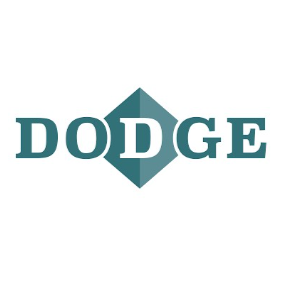Production Engineering
Mr. Scott Fowler
South Carolina continues to grow as a leader in advanced manufacturing, with global companies like BMW and Boeing driving innovation across our state. As smart manufacturing accelerates, the need for skilled workers in precision machining and production engineering is rising faster than employers can fill positions. Our Production Engineering program (formerly Machine Tool Technology) helps close that gap by preparing students for the modern manufacturing world, where traditional machining meets digital transformation.
Students learn how today’s manufacturers design, program, and produce high-quality products by combining the precision of machining with the creativity and problem solving of engineering. They explore the world of smart manufacturing, blending additive and subtractive technologies to design, program, and produce precision parts using advanced CNC and 3D printing systems.
Our Production Engineering program is part of the South Carolina Advanced Manufacturing Career Cluster. This two-year program equips students with the technical skills and engineering mindset needed to thrive in high-tech, high-demand manufacturing environments. Instruction blends classroom learning with extensive hands-on training on industry-standard equipment.
What you’ll do:
- Learn blueprint reading, measurement, and shop safety
- Operate milling machines, lathes, and other production tools
- Gain experience in Computer Numerical Control (CNC) operations and programming
- Explore smart manufacturing concepts tied to real industry practices
- Use additive and subtractive processes to solve production challenges
- Apply engineering principles to improve product quality and efficiency
Certifications you can earn:
- Tier 1: OSHA-10, Stop the Bleed, YouScience Industry Certification: Entrepreneurship, Snap-on/NC3 Precision Measurement
- Tier 2: Titans of CNC Expert, Digital Multimeter (DMM) Certification 525
- Tier 3: TBD (Advanced CNC/production engineering certifications)
Students earn two high school credits each semester and up to eight credits over the two-year program. Credits count as electives toward South Carolina graduation requirements, and one credit may fulfill the CATE/Foreign Language requirement.
Visit us: Are you interested in meeting Mr. Fowler and touring our Production Engineering lab? After-school tours for prospective students and parents are available in December, January, and February. We’d love to show you the program and answer any questions you may have.
Year One: Building the Foundation
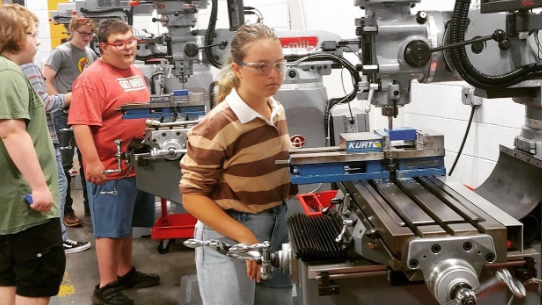
Production Engineering 1 & 2 — (AM Session at Enoree)
Year one of the Production Engineering program gives students a strong foundation in machining while stretching their skills into engineering and production concepts. Open to rising 10th and 11th graders, students attend Enoree Career Center during the morning session as part of their two-year commitment. Training begins with blueprint reading, shop safety, and the fundamentals of measurement and layout. Students quickly progress to operating lathes and milling machines, applying math, science, and problem-solving to projects that demand accuracy and precision.
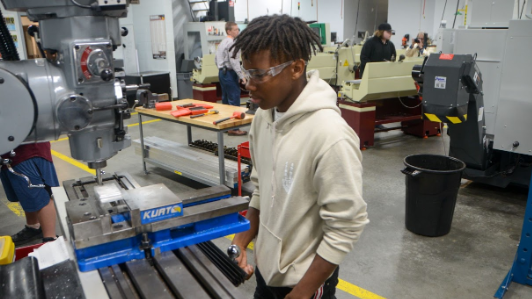
As students advance through Production Engineering 2, instruction expands into CNC programming and operations while introducing the engineering mindset—how designs move from concept to production. Students are challenged to think like engineers, applying creativity, analysis, and teamwork to machining and production problems. This approach bridges hands-on machining skills with the problem-solving expected in higher education.
By the end of year one, students will have earned certifications such as OSHA-10, Stop the Bleed, YouScience Entrepreneurship, and Snap-on/NC3 Precision Measurement while also gaining exposure to industry-standard software and equipment.
Year Two: Advancing the Skills
Production Engineering 3 & 4 — (PM Session at Enoree)
Year two of the Production Engineering program challenges students to apply their machining skills to advanced CNC operations and engineering-based projects that reflect the demands of modern manufacturing. Students attend Enoree Career Center during the afternoon session as part of their two-year commitment. Training emphasizes CNC programming, multi-axis machining, precision measurement, and integrating computer-aided design (CAD) with production processes. Students gain deeper insight into how engineers plan, design, and improve products while also learning to coordinate teams and manage production for efficiency, quality, and innovation.
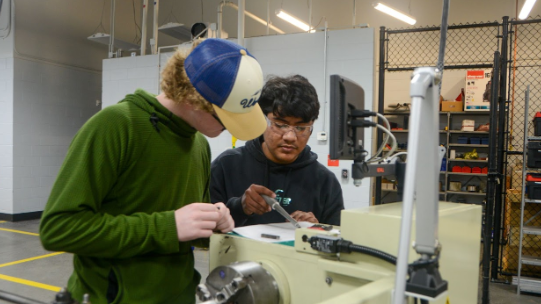
As students progress through Production Engineering 3 and 4, they take on advanced projects that require both technical skill and engineering problem-solving. Instruction covers process improvement, tolerances, materials analysis, and the use of software to connect design to production. Students also strengthen teamwork, communication, and project management skills that mirror expectations in professional manufacturing settings.
A key feature of year two is participation in work-based learning placements with local manufacturers and partners. These opportunities allow students to apply classroom training, gain hands-on experience, and begin building professional networks. By the end of year two, students are prepared to test for certifications such as Titans of CNC Expert and Digital Multimeter (DMM) Certification 525. Graduates leave with certifications, WBL experience, and engineering-focused training that positions them for advanced manufacturing jobs or further education, including degrees at Greenville Tech, Wofford, or Clemson.
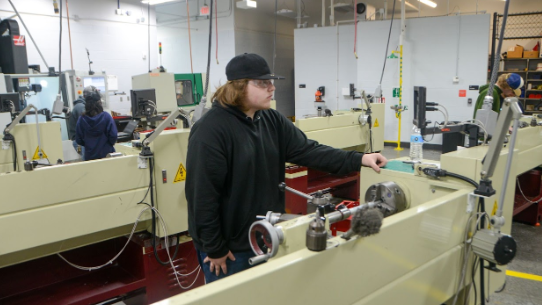
Career Opportunities
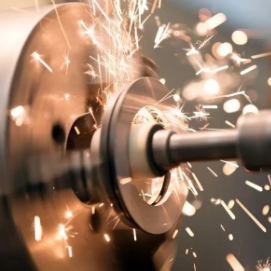
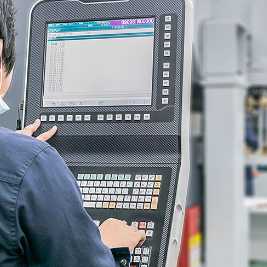
Machinist
Machinists read blueprints and make calculations. They feed material to machines, monitor and control processes, select and maintain tools, regulate temperature, ensure lubrication, and detect and troubleshoot malfunctions. Once they ensure the work accurately follows plans and blueprints, they produce the parts to order.
Salary- $42,147 per year on average, or $20.26 per hour
Production Supervisor
Production supervisors oversee teams of machinists and operators, ensuring safety, efficiency, and quality in a manufacturing environment. They combine technical knowledge with leadership and management skills.
Salary - $65,262 per year on average, or $31.38 per hour
Mechanical or Manufacturing Engineer
Engineers design, improve, and manage production systems, connecting the principles of engineering with the realities of manufacturing. They analyze data, improve efficiency, and innovate solutions for industry challenges.
Salary - $80,000–$95,000 per year on average, depending on role and education level
Job Skills & Requirements
Each skill and trade requires a specific skill set to master the content and job tasks. Below are a few critical skills and requirements needed to succeed in the program and throughout a career in this field.
- Analytical & Systems Thinking – Apply engineering analysis and critical observation to ensure precision, improve processes, and solve production challenges.
- Blueprint & CAD/CAM Interpretation – Read and translate engineering drawings and digital models into accurate machining and production outputs.
- Precision & Technical Accuracy – Use advanced tools and machines with consistency, ensuring products meet engineering specifications.
- Safety & Operational Discipline – Maintain safety standards and stamina while working in high-tech manufacturing labs and production environments.
- Fabrication & Integrated Assembly – Apply machining, welding, and joining methods to engineer and assemble precision components.
- CNC Programming & Automation – Develop, set up, and run automated machining systems that link design software to real-world production.
- Collaboration & Engineering Communication – Work as part of a production team, using clear technical communication and professionalism to complete engineering projects.
Available Certification Opportunities
(Click logos below for more information)
Local Work-Based Learning Partners
(Click logos below to visit our partners)
NOTE: Credits earned will count as electives needed for the SC high school graduation requirements. One of the credits earned may fulfill the CATE/Foreign Language requirement for SC high school graduation. Most 4-year colleges will NOT accept career center courses as a substitute for the foreign language college admissions requirement.


